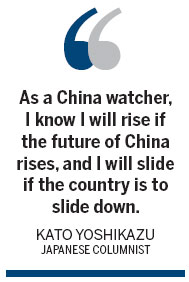

Kato says jogging and meditation are two of his best defenses against the depression of down days.
In his next five-year-plan, he lists running and the realizing of his childhood dream of becoming an accomplished athlete as priorities. But even higher up the list, he wants to consolidate his studies on China.
Kato grew from a foreign student to an expert on China with authority with The Third Eye, one of his most influential columns, which appears on the Financial Times Chinese Website and lasted seven years. The column's editor Wang Fang says Kato is among their most productive columnists.
"He contributes a mirror-like reflection for Chinese readers from the point of a foreigner who's deeply rooted in China," Wang says.
Kato doesn't see his accumulating influence in China as a success, and he would rather call it "maturity".
"I've made working hard a fixed status of my life. I'll never be satisfied with myself, I could do even better," he says.
Kato was born the eldest son in a financially disadvantaged family in Izu. After he had finished with the suffering and distress of paying back debts and raising his younger siblings, he arrived in Beijing in 2003. He knew no one, spoke no Chinese and had no money.
"I knew nothing about the country except its huge population, Chairman Mao and the phrase hello," he says, adding that he has long hoped to become a United Nations officer.
Despite his English fluency as a part-time translator in high school to help out his family, he chose China because "I couldn't afford countries like the US, and I was here because people speak one of the six UN official languages".
He got his bachelor's and master's degree on international relations from Peking University. Soon, he was active in social work and spoke on TV representing Japanese students in China.
"I deeply remember two images of Kato. He was jogging on campus in extremely colorful outfits, and going to class in a formal suit among a class dressed in casual clothes," says Yang Hui, a Guangdong-based media worker who was also Kato's classmate in Peking University.
"The girls in class were mad about Kato, who was doing real work, and getting involved in high level social activities," Yang says. "And he impressed us with his Chinese fluency."
Kato says he has been a faithful reader of the People's Daily, and he also watched the national news bulletins every day. They helped him learn the language and were also barometers of the country's political climate.
"I benefited a lot from them in the range of my writing, and I also got to know the rules of the game."
Kato has a habit of taking notes in a foreign language, and feels that to learn effectively, you have to read, communicate, travel and meet people.
In his future days as a research fellow at Harvard's Kennedy School, he will tell stories of real and brave Chinese people seen through his eyes, and he will also continue to tell his Chinese readers how he sees the Western world.
"I will remain a third party, and a bridge," he says.
Kato says he'll probably miss traffic jams, Weiming Lake at Peking University and Beijing hutong - but he leaves with no regrets. "I've tried my best at things I can do, and I don't expect to accomplish things I can't," he says.
Contact the writer at [email protected].